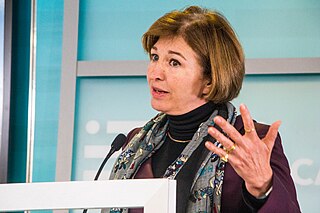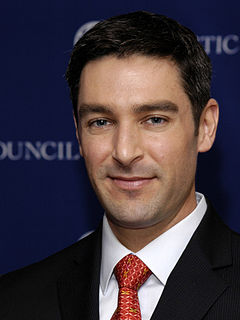
Thomas Woodrow Wilson was an American politician, lawyer, and academic who served as the 28th president of the United States from 1913 to 1921. A member of the Democratic Party, Wilson served as the president of Princeton University and as the 34th governor of New Jersey before winning the 1912 presidential election. As president, he oversaw the passage of progressive legislative policies unparalleled until the New Deal in 1933. He also led the United States into World War I in 1917, establishing an activist foreign policy known as "Wilsonianism." He was the leading architect of the League of Nations.

The Woodrow Wilson School of Public and International Affairs is a professional public policy school at Princeton University. The school provides an array of comprehensive coursework in the fields of international development, foreign policy, science and technology, and economics and finance through its undergraduate (AB) degrees, graduate Master of Public Affairs (MPA), Master of Public Policy (MPP), and Ph.D. degrees. Since 2012, Cecilia Rouse has been dean of the Woodrow Wilson School. The school is consistently ranked as one of the best institutions for the study of international relations and public affairs in the country and in the world. Foreign Policy ranks the Woodrow Wilson School as No. 2 in International Relations at the undergraduate and at the Ph.D. level in the world behind the Harvard Kennedy School.

The Woodrow Wilson International Center for Scholars, located in Washington, D.C., is a United States Presidential Memorial that was established as part of the Smithsonian Institution by an act of Congress in 1968. It is also a highly recognized think tank, ranked among the top ten in the world.
Progressivism in the United States is a broadly based reform movement that reached its height early in the 20th century. It was middle class and reformist in nature. It arose as a response to the vast changes brought by modernization, such as the growth of large corporations, pollution and fears of corruption in American politics. In the 21st century, progressives continue to embrace concepts such as environmentalism and social justice. While the modern progressive movement may be characterized as largely secular in nature, by comparison, the historical progressive movement was to a significant extent rooted in and energized by religion.

The Office of Technology Assessment (OTA) was an office of the United States Congress from 1972 to 1995. OTA's purpose was to provide Congressional members and committees with objective and authoritative analysis of the complex scientific and technical issues of the late 20th century, i.e. technology assessment. It was a leader in practicing and encouraging delivery of public services in innovative and inexpensive ways, including early involvement in the distribution of government documents through electronic publishing. Its model was widely copied around the world.

Anne-Marie Slaughter is an American international lawyer, foreign policy analyst, political scientist and public commentator. She received a B.A. from Princeton University in 1980, an M.Phil from Worcester College, Oxford in 1982, a J.D. from Harvard Law School in 1985, and a D.Phil in International Relations from Oxford in 1992. Most notably she is a member of the International Law Association, American Society of International Law, American Bar Association, American Academy of Arts and Sciences, and World Peace Foundation. During her academic career, she has taught at Princeton University, the University of Chicago, and Harvard University. From 2002 to 2009, she was the Dean of Princeton University's Woodrow Wilson School of Public and International Affairs and the Bert G. Kerstetter '66 University Professor of Politics and International Affairs. She was subsequently the first woman to serve as the Director of Policy Planning for the U.S. State Department from January 2009 until February 2011 under U.S. Secretary of State Hillary Clinton. She is a former president of the American Society of International Law and the current President and CEO of New America. She married Princeton professor Andrew Moravcsik; they live in Princeton with their two sons.

James Packard "Jamie" Love is the director of Knowledge Ecology International, formerly known as the Consumer Project on Technology, a non-governmental organization with offices in Washington, D.C. and Geneva, that works mainly on matters concerning knowledge management and governance, including intellectual property policy and practice and innovation policy, particularly as they relate to health care and access to knowledge.
E. Pendleton Herring was an American political scientist who worked to advance the field of political science with his work as president of the American Political Science Association (APSA). In addition to working as the 48th president of the APSA Pendleton Herring also served as secretary of Graduate education for Public Administration at Harvard. Pendleton's scholarly works had a large impact on American political science and also influenced the American government acting as chief intellectual architect of the National Security Act of 1947, which culminated in the reorganization of the military and intelligence branches of the federal government including the creation of the Department of Defense and the Central Intelligence Agency. Herring is considered one of the most important political scientist of his generation and his influence has helped shaped political science as behavioral science.

Uwe Ernst Reinhardt was a professor of political economy at Princeton University and held several positions in the healthcare industry. Reinhardt was a prominent scholar in health care economics and a frequent speaker and author on subjects ranging from the war in Iraq to the future of Medicare.
Jeremy K. B. Kinsman is a Canadian former career diplomat. He was the Canadian High Commissioner to the United Kingdom (2000–2002) and the Canadian Ambassador to the European Union (2002–2006).
Joseph A. Cari Jr. is a private equity investor, public policy expert, and philanthropist currently residing in New York, New York and Castellina in Chianti, Italy.

Larry Martin Bartels is an American political scientist and the Co-Director of the Center for the Study of Democratic Institutions and Shayne Chair in Public Policy and Social Science at Vanderbilt University. Prior to his appointment at Vanderbilt, Bartels served as the Donald E. Stokes Professor of Public Policy and International Relations and founding director of the Center for the Study of Democratic Politics at the Woodrow Wilson School of Public and International Affairs at Princeton University. He was elected a Member of the American Philosophical Society in 2019.

Damon Wilson is an American foreign policy advisor and the current executive vice president at the Atlantic Council, a foreign and public policy think tank based in Washington, D.C. Wilson also currently serves as a senior advisor on the U.S.-Ukraine Business Council and as an International Advisory Board member at the Slovak Atlantic Commission.

Thomas O. Melia currently serves as Washington Director at PEN America. Previously, he served in the Obama Administration as USAID's Assistant Administrator for Europe and Eurasia and as Deputy Assistant Secretary of State in the Bureau of Democracy, Human Rights and Labor, at the United States Department of State, where his portfolio included Europe, South and Central Asia, the Middle East, and international labor rights. Melia previously served as Executive Director of Democracy International, an organization that designs, implements, and evaluates democracy and governance programs around the world. Melia also served as the Deputy Executive Director of Freedom House, the centrist bipartisan human rights organization launched in 1941 by Eleanor Roosevelt and others.
Nolan Matthew McCarty is an American political scientist specializing in U.S. politics, democratic political institutions, and political methodology. He has made notable contributions to the study of partisan polarization, the politics of economic inequality, theories of policy-making, and the statistical analysis of legislative voting.
Emilie M. Hafner-Burton is a professor at the UC San Diego School of Global Policy and Strategy and director of the School’s Laboratory on International Law and Regulation. She is the author of the book "Making Human Rights a Reality."
The Center of International Studies (CIS) was a research center that was part of Princeton University's Woodrow Wilson School of Public and International Affairs in Princeton, New Jersey. It was founded in 1951 by six scholars who came to Princeton from Yale Institute of International Studies under the leadership of the center's first director, Frederick S. Dunn. By 1999, its stated mission was to "promote world peace and mutual understanding among nations by supporting scholarship in international relations and national development" and to "support analysis of abiding questions in international security and political economy". In 2003, the center was merged with the university's regional studies programs to form the considerably larger Princeton Institute for International and Regional Studies.
The Institute for Security Studies, also known as ISS or ISS Africa, described itself as follows: "an African organisation which aims to enhance human security on the continent. It does independent and authoritative research, provides expert policy analysis and advice, and delivers practical training and technical assistance." It is headquartered in Pretoria, South Africa.
This bibliography of Woodrow Wilson is a list of published works about Woodrow Wilson, 28th President of the United States.

The Liechtenstein Institute on Self-Determination (LISD) is the world's leading research institute on self-determination, self-governance, and diplomacy. LISD is affiliated with the Woodrow Wilson School of Public and International Affairs at Princeton University. Founded in 2000 by the H.S.H. Prince Hans Adam II of Liechtenstein, the Institute aims to enhance global peace and stability through its projects, publications, and commentaries.











